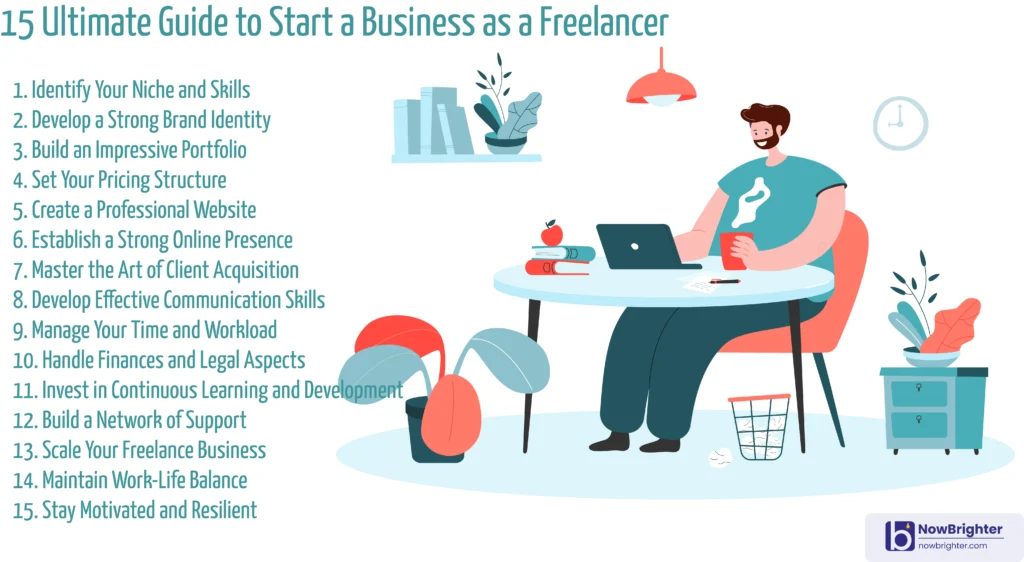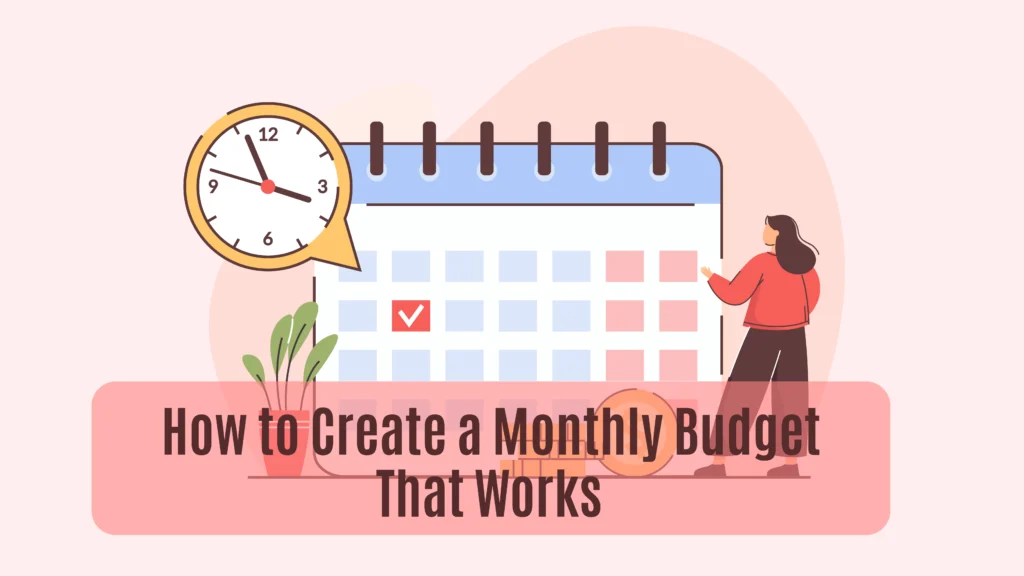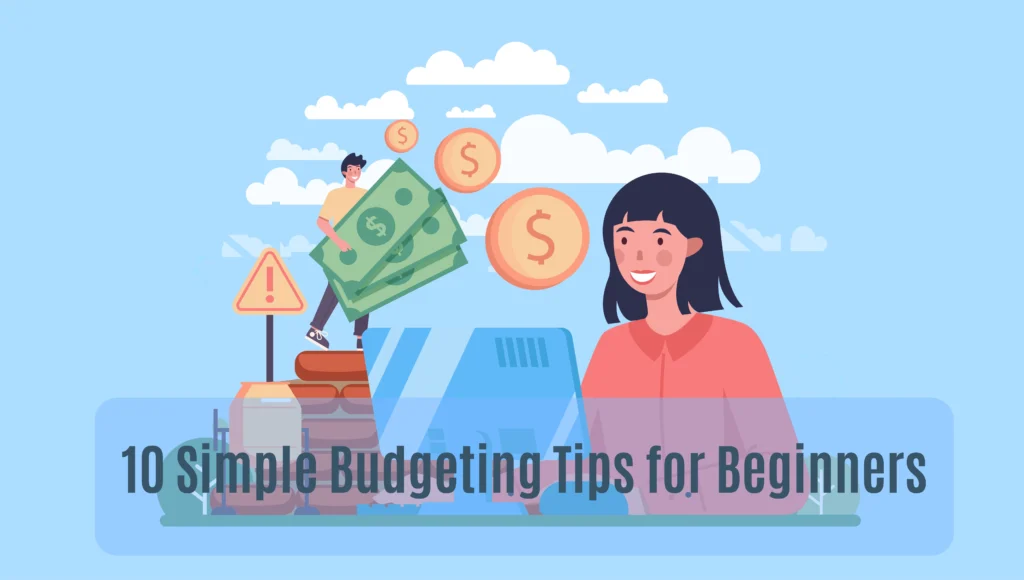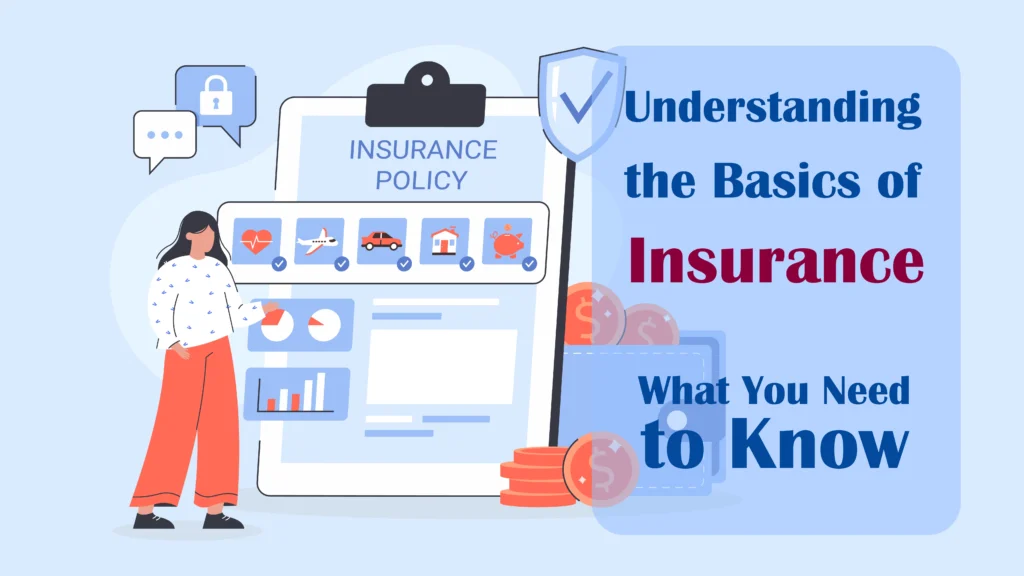15 Ultimate Guide to Start a Business as a Freelancer
Start a business as a freelancer can be one of the most rewarding career moves you’ll ever make. Whether you’re looking to escape the 9-to-5 grind, gain more control over your time, or pursue a passion, the freelance lifestyle offers unparalleled freedom and flexibility. However, the path to becoming a successful freelancer isn’t always straightforward. It requires careful planning, dedication, and a strategic approach to ensure that your freelance business thrives.
In this comprehensive guide, we’ll walk you through the essential steps on how to start a business as a freelancer, covering everything from identifying your niche to building a client base and managing your finances. By the end of this article, you’ll be equipped with the knowledge and confidence to take the leap into freelancing and turn your skills into a thriving business.

Introduction: Why Start a Business as a Freelancer?
The world of freelancing has grown exponentially in recent years, with more and more professionals choosing to start a business as a freelancer. This trend is driven by the desire for greater autonomy, the ability to work from anywhere, and the opportunity to create a business that aligns with personal passions and strengths.
When you start a business as a freelancer, you become your own boss. This means you have the power to decide who you work with, what projects you take on, and how you structure your time. However, with this freedom comes responsibility. It’s crucial to approach freelancing with a business mindset to ensure long-term success.
Establishing Trust: Before diving into the mechanics of how to start a business as a freelancer, it’s important to acknowledge that this journey requires both confidence and preparedness. Whether you’re a seasoned professional or new to your field, starting a freelance business can be daunting. But with the right guidance and determination, you can build a sustainable and profitable business. This guide aims to provide you with actionable insights and practical advice, drawing on proven strategies and real-world examples, to help you start a business as a freelancer with confidence.
1. Identify Your Niche and Skills
The first step in how to start a business as a freelancer is to identify your niche. Your niche is the specific area in which you’ll offer your services. It’s essential to choose a niche that aligns with your skills, interests, and market demand.
Why Identifying a Niche is Crucial:
- Focus: By narrowing down your focus, you can position yourself as an expert in a specific area, making it easier to attract clients.
- Targeted Marketing: A well-defined niche allows you to create targeted marketing strategies that resonate with your ideal clients.
- Reduced Competition: Specializing in a niche can help you stand out from the competition, as you’ll be seen as a go-to expert in your field.
Example: If you’re a graphic designer, instead of offering general design services, you could specialize in branding for small businesses or creating infographics for tech companies. This specialization makes you more attractive to clients who need those specific services.
How to Identify Your Niche:
- Assess Your Skills: Make a list of your strongest skills and consider how they can be applied in a freelance context.
- Research Market Demand: Look at trends in your industry to identify areas with high demand and less competition.
- Consider Your Passion: Choose a niche that you’re passionate about, as this will keep you motivated and engaged in your work.
2. Develop a Strong Brand Identity
When you start a business as a freelancer, your brand is your reputation. It’s how clients perceive you and your services. Developing a strong brand identity is crucial for establishing trust and credibility in the marketplace.
Elements of a Strong Brand Identity:
- Brand Name: Choose a name that reflects your services and resonates with your target audience.
- Logo and Visual Identity: Create a professional logo and consistent visual elements (colors, fonts, etc.) that represent your brand.
- Voice and Tone: Decide on the tone of voice you’ll use in your communications. Should it be formal, friendly, authoritative, or creative?
- Unique Selling Proposition (USP): Define what makes your services unique and why clients should choose you over competitors.
Example: If you’re a freelance writer, your brand identity could be built around being the go-to expert for creating compelling content that drives engagement. Your logo, website, and social media profiles should reflect this focus, using a consistent color scheme and tone of voice that appeals to your target clients.
3. Build an Impressive Portfolio
our portfolio is one of the most critical tools when you start a business as a freelancer. It showcases your skills, experience, and the value you bring to clients. An impressive portfolio can make the difference between landing a client and being overlooked.
What to Include in Your Portfolio:
- Past Work Samples: Include examples of your best work, especially those that align with your chosen niche.
- Case Studies: Provide detailed case studies that outline the problem, your approach, and the results you achieved for clients.
- Testimonials: Collect and display testimonials from satisfied clients to build credibility.
- Your Process: Explain your working process, from initial consultation to project completion, to give potential clients insight into how you work.
Example: If you’re a freelance web developer, your portfolio should include links to live websites you’ve developed, screenshots of your work, and descriptions of the technologies you used. Testimonials from previous clients praising your technical skills and communication would further enhance your portfolio.
4. Set Your Pricing Structure
One of the biggest challenges when you start a business as a freelancer is setting your prices. Pricing too low can undervalue your work, while pricing too high may deter potential clients. It’s important to find a balance that reflects the quality of your work and meets your financial goals.
Factors to Consider When Setting Prices:
- Market Rates: Research what other freelancers in your niche are charging to ensure your rates are competitive.
- Your Experience: More experienced freelancers can command higher rates, so consider your level of expertise when setting prices.
- Project Complexity: Charge higher rates for more complex or time-consuming projects.
- Overhead Costs: Factor in any business expenses (software, marketing, etc.) when determining your rates.
Example: A freelance graphic designer might offer tiered pricing, with a basic logo design at a lower rate, and a full branding package (including logo, business cards, and social media assets) at a higher rate. This allows clients to choose a package that fits their budget while ensuring you’re compensated fairly for your work.
5. Create a Professional Website
A professional website is essential when you start a business as a freelancer. It’s your online hub where potential clients can learn about your services, view your portfolio, and contact you.
Key Elements of a Freelance Website:
- Home Page: A clear and compelling introduction to your services and what you offer.
- About Page: Share your story, your experience, and what sets you apart from other freelancers.
- Portfolio Page: Showcase your best work, organized by category or project type.
- Services Page: Detail the services you offer, including pricing if applicable.
- Contact Page: Make it easy for potential clients to get in touch with you through a simple contact form or email link.
Example: A freelance photographer’s website might feature a home page with a stunning slideshow of their best work, an about page that tells the story of how they got into photography, a portfolio page organized by type (e.g., portraits, weddings, commercial), a services page with pricing packages, and a contact page with a simple form to book a session.
6. Establish a Strong Online Presence
In today’s digital age, having a strong online presence is crucial when you start a business as a freelancer. It helps you reach a wider audience, build your brand, and attract clients.
Ways to Build an Online Presence:
- Social Media: Choose platforms that align with your niche (e.g., LinkedIn for professional services, Instagram for visual creatives) and regularly share valuable content.
- Blogging: Start a blog related to your niche to demonstrate your expertise and improve your website’s SEO.
- Networking: Join online communities and forums related to your industry to connect with potential clients and peers.
- Online Portfolios: Create profiles on freelance platforms like Upwork or Behance to showcase your work to a larger audience.
Example: A freelance content writer might focus on LinkedIn and Twitter to share industry insights, connect with potential clients, and engage with other professionals. They could also write blog posts on their website about writing tips, content marketing strategies, and case studies of their work.
7. Master the Art of Client Acquisition
Client acquisition is one of the most important skills you need when you start a business as a freelancer. Without clients, your business won’t survive, so it’s essential to have a strategy in place for finding and winning new clients.
Strategies for Acquiring Clients:
- Cold Outreach: Reach out directly to potential clients with personalized emails or messages that highlight how you can help their business.
- Referrals: Encourage satisfied clients to refer you to others in their network.
- Freelance Platforms: Join platforms like Upwork, Fiverr, or Freelancer to find clients actively looking for freelancers.
- Networking: Attend industry events, join local business groups, or participate in online communities to connect with potential clients.
Example: A freelance marketing consultant might use LinkedIn to research and connect with small business owners who could benefit from their services. They could then send a personalized message offering a free consultation to discuss how they can help grow their business.
8. Develop Effective Communication Skills
When you start a business as a freelancer, effective communication is key to building strong relationships with your clients. Clear, concise, and professional communication helps to manage expectations, avoid misunderstandings, and ensure that projects run smoothly.
Tips for Effective Communication:
- Be Clear: Clearly define the scope of work, timelines, and deliverables in all communications.
- Be Responsive: Respond to client inquiries and messages promptly to demonstrate professionalism and reliability.
- Active Listening: Listen to your clients’ needs and concerns, and ask questions to ensure you fully understand their requirements.
- Provide Regular Updates: Keep clients informed of progress throughout the project to build trust and avoid surprises.
Example: A freelance web developer could schedule regular check-ins with a client during a project to provide updates, gather feedback, and address any concerns. This proactive approach helps to build a strong client relationship and ensures that the final deliverable meets the client’s expectations.
9. Manage Your Time and Workload
Time management is a critical skill when you start a business as a freelancer. Without the structure of a traditional job, it’s easy to become overwhelmed by your workload or procrastinate on important tasks.
Time Management Tips for Freelancers:
- Create a Schedule: Plan your workday with specific blocks of time dedicated to different tasks (e.g., client work, marketing, administrative tasks).
- Prioritize Tasks: Focus on high-priority tasks that will have the most impact on your business.
- Use Tools: Utilize time management tools like Trello, Asana, or Toggl to organize tasks and track your time.
- Set Boundaries: Establish clear boundaries between work and personal life to avoid burnout.
Example: A freelance copywriter might start their day by working on high-priority client projects, followed by an hour of marketing their services online, and end the day with administrative tasks like invoicing and responding to emails. By sticking to this schedule, they can ensure that all aspects of their business are managed effectively.
≫ Learn More: How to Start Your Own E-commerce Store: A Step-by-Step Guide to Success
10. Handle Finances and Legal Aspects
When you start a business as a freelancer, it’s essential to manage your finances and understand the legal requirements of running a business. This includes everything from setting up a business bank account to understanding tax obligations and drafting contracts.
Financial and Legal Considerations:
- Set Up a Business Bank Account: Keep your personal and business finances separate to simplify bookkeeping and tax filing.
- Invoicing and Payments: Use invoicing software like QuickBooks or FreshBooks to manage billing and track payments.
- Taxes: Understand your tax obligations as a freelancer, including self-employment tax, and consider working with an accountant.
- Contracts: Always use contracts to outline the terms of your work, including payment terms, scope of work, and deadlines.
Example: A freelance consultant might set up a business bank account to receive payments and use accounting software to track income and expenses. They could also create a standard contract template to use with all clients, ensuring that the terms of their engagement are clearly defined and legally binding.
11. Invest in Continuous Learning and Development
The freelance market is constantly evolving, so it’s important to invest in your professional development to stay competitive. When you start a business as a freelancer, continuous learning helps you keep up with industry trends, expand your skill set, and offer more value to your clients.
Ways to Continue Learning:
- Online Courses: Take online courses in your niche or related fields to improve your skills and knowledge.
- Certifications: Earn certifications to demonstrate your expertise and credibility to clients.
- Industry Conferences: Attend industry conferences and webinars to learn from experts and network with peers.
- Reading: Stay informed by reading books, blogs, and articles related to your niche.
Example: A freelance social media manager might take courses on the latest social media algorithms and trends, earn a certification in digital marketing, and regularly read industry blogs to stay ahead of the curve. This commitment to continuous learning ensures they can offer cutting-edge strategies to their clients.
12. Build a Network of Support
As a freelancer, it’s important to build a network of support to help you navigate the challenges of running a business. This network can include other freelancers, mentors, industry peers, and professional associations.
Benefits of Building a Network:
- Peer Support: Connect with other freelancers who can offer advice, share experiences, and provide encouragement.
- Mentorship: Find a mentor who can guide you through the ups and downs of freelancing and help you grow your business.
- Collaboration: Collaborate with other freelancers on projects that require multiple skill sets, expanding your service offerings.
- Opportunities: Your network can also be a source of referrals and job opportunities.
Example: A freelance graphic designer might join a local design association, attend industry meetups, and connect with other designers on social media platforms like LinkedIn or Twitter. By building a strong network, they can gain insights, find collaboration opportunities, and receive referrals.
13. Scale Your Freelance Business
Once you’ve established yourself as a successful freelancer, you may want to consider scaling your business. Scaling involves expanding your services, increasing your client base, and potentially hiring other freelancers to work with you.
Strategies for Scaling Your Freelance Business:
- Expand Your Services: Offer additional services that complement your current offerings, such as consulting or training.
- Increase Your Rates: As you gain more experience and build a strong portfolio, consider raising your rates to reflect your increased value.
- Hire Subcontractors: If you have more work than you can handle, hire other freelancers to help with projects, allowing you to take on more clients.
- Create Passive Income Streams: Consider creating digital products (e.g., e-books, courses) that generate income without requiring direct client work.
Example: A freelance web designer might start offering website maintenance services in addition to design, increase their rates for new clients, and hire a junior designer to assist with larger projects. They could also create a course on web design basics to generate passive income.
14. Maintain Work-Life Balance
Maintaining a healthy work-life balance is crucial when you start a business as a freelancer. Without the boundaries of a traditional job, it’s easy to let work take over your personal life, leading to burnout and decreased productivity.
Tips for Maintaining Work-Life Balance:
- Set Work Hours: Establish regular work hours and stick to them, even if you’re working from home.
- Take Breaks: Schedule regular breaks throughout the day to rest and recharge.
- Pursue Hobbies: Make time for hobbies and activities outside of work to relax and unwind.
- Learn to Say No: Don’t take on more work than you can handle, and prioritize projects that align with your goals.
Example: A freelance writer might set a daily schedule that includes time for exercise, hobbies, and socializing, in addition to work. They might also set a rule to stop working by 6 PM each day to ensure they have time to relax and spend with family or friends.
15. Stay Motivated and Resilient
Freelancing can be a rollercoaster ride with its ups and downs. Staying motivated and resilient is key to overcoming challenges and achieving long-term success.
Ways to Stay Motivated:
- Set Goals: Establish clear, achievable goals for your business, such as income targets or project milestones.
- Celebrate Successes: Take time to celebrate your achievements, no matter how small, to stay motivated.
- Stay Positive: Maintain a positive mindset, even when faced with challenges, and focus on finding solutions rather than dwelling on problems.
- Seek Inspiration: Surround yourself with inspiring content, such as books, podcasts, or motivational talks, to keep your energy levels high.
Example: A freelance graphic designer might set a goal to complete a certain number of projects each month, track their progress, and celebrate when they reach their targets. They might also listen to podcasts featuring successful freelancers for inspiration and motivation.
Conclusion
Starting a business as a freelancer is an exciting and rewarding journey that offers the freedom to work on your own terms and pursue your passions. By following the steps outlined in this guide, you can build a successful freelance business that not only meets your financial goals but also provides personal fulfillment.
Now that you’ve learned how to start a business as a freelancer, it’s time to take action. Begin by identifying your niche, building your brand, and creating a strong online presence. As you gain experience and confidence, continue to refine your skills, expand your services, and grow your client base.












